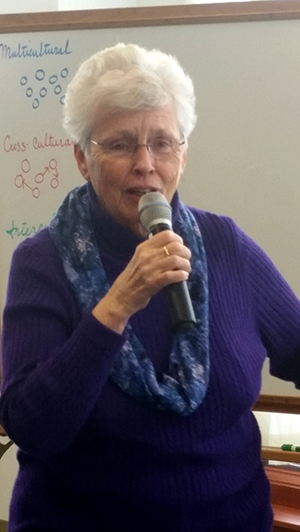Growing up on a farm in a small Michigan town, Immaculate Heart of Mary Sister Kathryn Pierce assumed everyone in the world was white, Catholic, Irish and a Democrat. It wasn’t until she joined her religious community and began ministering in Puerto Rico that she realized just how limited and biased her cultural experience was.
Sister Kathryn, executive director of Intercultural Consultation Services, shared that recollection during a workshop on multiculturalism Feb. 28 at Salem Heights. The story helped illustrate how narrow we can be in thinking about culture.
“That was my cultural upbringing,” Sister Kathryn said. “I think if we all look back into our families, we can see what was there. What were the values and beliefs? That’s how we started out and until there was some kind of a change, we continued living that way.
More than 50 people attended the workshop including Precious Blood Sisters and members of the Congregation’s Vocation Ministry Committee, who will use the information in their efforts to promote vocations to the Sisters of the Precious Blood.
In her presentation, Sister Kathryn urged participants to identify things they can do – as individuals and together – to promote multiculturalism.
“We know that as community builders our business is to be able to recognize the differences in culture, in religion, and to be able to not let those differences separate us because it would be pretty boring if we were all the same,” Sister Kathryn said. “Each one of us is a cultural being. We come with a unique culture, but we come together to form a group.”
In opening the workshop, Sister Kathryn distributed an image by artist Wade Davis depicting numerous symbols. She asked the participants to envision the image as a prayer collage and identify the symbols associated with various cultures.
Among the symbols was the depiction of a white person as being dominant. Although that has been the norm in the United States, it is changing.
“Very soon the white will not be the dominate culture here in the United States,” Sister Kathryn said. “Very soon, even though we may act and think we are. That’s what we have to be very careful of, and that’s what makes intercultural living so difficult because we think we come from the dominant.”
Davis’ image also had a reflection that the participants contemplated: “The world in which you were born is just one model of reality. Other cultures are not failed attempts at being you; they are unique manifestations of the human spirit.”
That can be a blow to the egos of some in the United States because we have the impression that everyone wants to be like us, Sister Kathryn explained. We think we might be the superior race. Still, she continued, think of how different the world would be if we accepted each other. It has to start with each of us and the communities to which we belong.
“It’s got to start here,” she said. “How can we do that? It’s going to demand a real transformation. We need to be missionary in our everyday activities.”
In helping to bridge the gap between cultures, Sister Kathryn also discussed various elements of effective conversation across cultures and the analogy of culture as part of the daylong workshop.
Story by Dave Eck
 IHM Sister Kathryn Pierce. Contributed photo
IHM Sister Kathryn Pierce. Contributed photo




